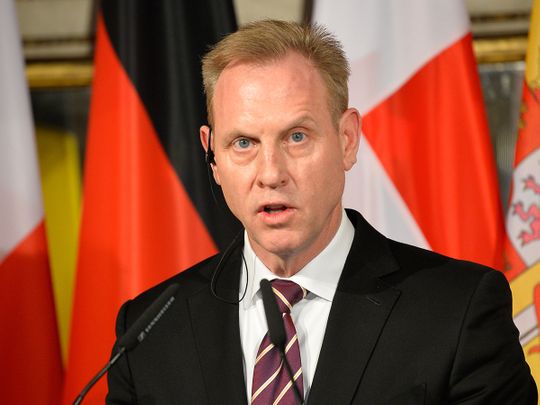
Washington: After two years of the battle-hardened and wizened Jim Mattis, President Donald Trump has chosen a flexible business manager to lead the Pentagon and support his anti-immigrant border operations: Patrick Shanahan.
The White House announced Trump’s intention to nominate Shanahan on Thursday, after the veteran Boeing engineer spent more than four months as acting secretary of defence - proving himself to a president who found Mattis, a former marine four-star general, too independent.
His nomination still requires confirmation from the Senate, where his predecessor enjoyed strong support as a crucial check against Trump’s most extreme ideas and where there could be doubts about Shanahan’s lack of soldiering experience.
But Shanahan, 56, will benefit from having been Mattis’s own pick in 2017 to be deputy secretary of defence, overseeing the management of the massive US military.
Boeing executive
Before joining the Pentagon, Shanahan spent 30 years at Boeing, where he earned the nickname Mr Fix-It for having put the problem-saddled Dreamliner program back on the tracks.
Mattis tapped Shanahan to bring his management skills to modernize the Pentagon’s procedures for its trillion-dollar acquisition program.
But Shanahan quickly drew criticism that he violated Defence Department ethics rules with his support for Boeing as a supplier while denigrating its competitors, notably aerospace company Lockheed Martin, the builder of the F-35 joint strike fighter.
After he was cleared of those allegations two weeks ago, the way was open for Trump’s nomination.
Still, the discreet divorced father of three will have a tough job following Mattis, whose deep experience as a battlefield commander and encyclopedic knowledge of military history and strategy awed soldiers in the field.
Mattis resigned in December when Trump abruptly announced he was pulling the US out of Syria, and slashing its troop numbers in Afghanistan.
Both moves, Mattis believed, were strategically bad and he stepped down, saying Trump needed a defence chief whose views were better aligned.
Since taking the position on January 1, Shanahan has mostly stayed out of the public eye and avoided clashing with the White House.
He has never served in the military and is more at home with finances than armed conflict.
Reacting to Trump’s decision to nominate him, he said he was “honoured.”
“If confirmed by the Senate, I will continue the aggressive implementation of our National Defence Strategy.”
“I remain committed to modernizing the force so our remarkable soldiers, sailors, airmen, and marines have everything they need to keep our military lethal and our country safe.”
Shanahan rarely speaks publicly, has yet to hold a formal press conference, and has only travelled abroad once, in February, on a trip to visit US troops in Kabul and Baghdad.
That same trip took him to international meetings in Brussels and Munich, where he appeared somewhat uneasy, given the widespread criticism of Trump’s policies.
Trump ‘likes him’
Shanahan has since taken great care to not rub the president the wrong way, and so far it appears to have paid off.
“I can tell you that the president has a great deal of respect for Acting Defence Secretary Shanahan. He likes him,” said White House spokeswoman Sarah Sanders recently.
He has gone along with Trump’s demand for more Pentagon resources to help police the US border with Mexico and to divert billions of dollars from the Defence Department’s budget to finance building a wall on the frontier.
Yet that put Shanahan in the line of fire in Congress, where legislators are none too happy about the diversion of Pentagon funds for the wall, which could impact other already-planned military construction projects.
Quizzed by Congress on whether the diversion will harm military activities, he said: “Military construction on the border will not come at the expense of our people, our readiness, or our modernization.”












